By Jeff Carter
Today the word of the day is neoteny. It’s really a term from evolutionary biology, but it describes the retention of childlike attributes in adults. You might think of a grown up who has a “baby face,” or is generally “cute.” When you are talking about these kinds of physical features, we tend to think it’s a good thing to have “young looking skin” or the “energy of youth,” for example. Neotenic people are usually attractive. Being neotenous is mostly a good thing.

But what about personality traits, attitudes or approaches to the world? What about these ways of being childlike? Think about what life is like as a child. The world is magical, full of curiosities, almost always kind and wondrous. As kids, we spend so much time being creative and playing. We feel so many more things— joy, excitement, anticipation, and the broad sensuous world around us. All of this probably makes it so easy to make friends (“Come on! Let’s play!).
You’ve also noticed what usually happens when we grow up. We get serious, we latch on to patterns of behavior, we get scared, we feel the need to protect what we believe, we accept responsibilities and feel pressure to perform and “be” someone in particular. As adults, we spend almost all of our time, mostly alone, working to stay organized and fighting opposing forces. We’re all too consumed by those adult things we’ve grown to accept as important, and it ain’t easy.
It’s no surprise to see that being an adult overpowers those childlike traits. Sadly, to grow up often means losing touch with what we used to be, those aspects of being human we loved as kids. As adults, we have a harder time feeling what makes the world wonderful, a harder time making friends, and a much harder time playing and having fun. Of course there are exceptions to this, but that’s the point. They are exceptions. And that’s too bad.
Let’s remember the value of being childlike even as adults.
Let’s be joyful as we’re responsible.
Let’s be curious when encountering opposing beliefs.
Let’s be friendly and playful, cooperative and excited about learning new things.
Let’s strive to foster our innate neotenous instincts.
Bringing this back to camp… Summer camp is a place where kids can really be kids. It’s a special time when they are encouraged to play, make friends, be creative and explore the world around them. Separate from the forces of home and school (which are fundamentally about forming “adults”), camp provides a wonderful opportunity to strengthen our “kid selves.” It celebrates and fosters the neotenous traits. Camp is a joyful break from all that training, and that’s a big part of why it’s so fun.
Maybe we could say…
Camp helps you learn how to be a really great kid so that later in life you’ll be a really great (happy, satisfied, remarkable) adult.
Camp’s power to strengthen these “kid traits,” I suspect, will be a big part of that success.



